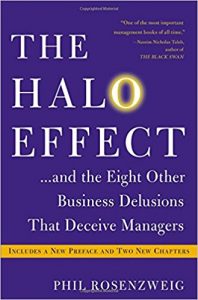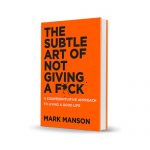Why You Cannot Learn Success from Successful People or Companies
 Did you read In Search of Excellence, Built to Last, From Good to Great or The 7 Habits of Highly Successful People?
Did you read In Search of Excellence, Built to Last, From Good to Great or The 7 Habits of Highly Successful People?
Did any one of them make you successful?
Of all the people who bought and read one or all of these books or some of the many other books that claim to have found the path to success, only a tiny fraction became successful. At least compared to how successful the authors became. Why is that so?
You can find the answers in another book namely The Halo Effect … and the Eight Other Business Delusions That Deceive Managers by Phil Rosenzweig.
You should read the book. It came out in 2007, and I’m surprised that I did not come across it before now. It is a brilliant book and enjoyable reading.
Phil Rosenzweig launches a brutal attack on all the books and management gurus that claim their comprehensive research has proven that by doing the things that successful people or companies do then you can become successful too. There is no such guarantee. There is not even a slight probability that you will receive the same results. You may be inspired, and that’s all.
Is business a science?
 If you hold a pen in your hand and loosen your grip, it will fall to the floor. Each time – it never fails. The phenomenon is described by the natural sciences, and the force in play is called the law of gravity. Using the insight provided by the natural sciences we are capable of predicting and foreseeing the consequences of numerous actions. As long as we can control the environment in which our activities take place, then the predictions can become highly accurate.
If you hold a pen in your hand and loosen your grip, it will fall to the floor. Each time – it never fails. The phenomenon is described by the natural sciences, and the force in play is called the law of gravity. Using the insight provided by the natural sciences we are capable of predicting and foreseeing the consequences of numerous actions. As long as we can control the environment in which our activities take place, then the predictions can become highly accurate.
Business is often said to be governed by the laws of the social sciences. Are the social sciences just like natural sciences?
Not quite.
Even when we do control the environment (in behavioral experiments), the outcome is never the same each time. We have to operate with probabilities. When you expose people to even basic challenges, they will come up with different solutions and responses. Because people are different.
Claiming that you can become successful by doing what successful people or companies have done ignores that fact that the circumstances have to completely identical, and they never are. NEVER!
(Economist use the term ceteris paribus meaning “all other things equal.” Without this assumption economics could not claim to be science at all.)
Where is the control group?
 If you find common traits among a group of highly successful people or companies, can you then conclude that copying these features will make you successful?
If you find common traits among a group of highly successful people or companies, can you then conclude that copying these features will make you successful?
What if I can find a group of highly unsuccessful people or companies and demonstrate that they have the same traits?
If you do not have a control group to verify your theory, then you have a substantial flaw in your scientific approach.
The research presented by most books and management gurus claiming that by doing A, B, C and D (which successful people and companies do) then you can become successful too, suffers from this serious flaw. Research is then reduced to anecdotes. Interesting and inspiring maybe, but nothing else.
What brought you there will not keep you there
Do we mistake what successful people or companies do after they became successful with what they did to get there?
Yes, we do. All the time.
Read the book and check out the examples given. Everybody, even the successful people, tend to make these mistakes. Becoming successful is an entirely different ball game from being successful. Not to speak of staying successful, which no one is capable of for longer stretches of time. (Successful in this context means performing better than most your peers.)
The halo effect
In its original form, it describes the human propensity to assume that people or companies who are good at A will also be good at B, C, and D (such as assuming that George Clooney knows more about coffee than you do just because he is a celebrity).
If a company is successful, then it must have great leaders, a super sharp strategy, highly motivated people and a great culture.
Not necessarily. Success in business is tightly related to timing. Especially the first success. If you are in the right place at the right time with the right value proposition, then even companies with common attributes can become successful. I didn’t do the research, but I’ll claim that timing is everything. Timing is extremely hard if not impossible to predict. You only know that it was right when you make the breakthrough.
In hindsight, we are all prophets.
Can you learn nothing?
There are books on methodologies such as The Lean Startup, Blue Ocean Strategy, Business Model Generation, The Startup Owner’s Manual and Value Proposition Design that gives a framework for finding your path to business success. They don’t pretend to have all the answers, but they help you become more systematic and methodical in your approach. They help you fail fast and learn from each failure. The more and the sooner you fail, the faster you will become successful.
I find that such books provide tremendous value. Especially if you are in the search for your next success, and if we are all completely honest, most of us are.









